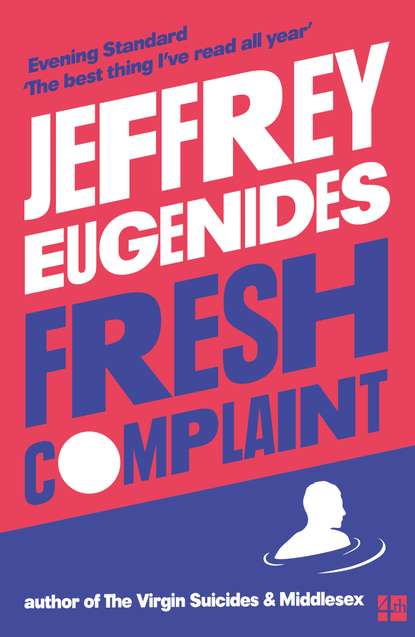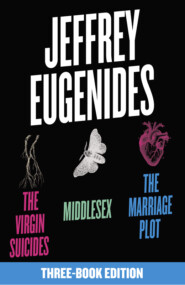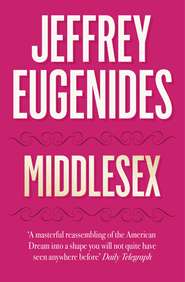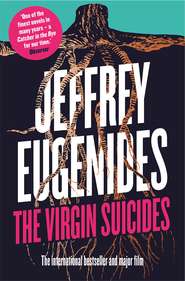По всем вопросам обращайтесь на: info@litportal.ru
(©) 2003-2024.
✖
Fresh Complaint
Автор
Год написания книги
2019
Настройки чтения
Размер шрифта
Высота строк
Поля
“Cheers.” He took a sip of beer. It tasted like the best beer he’d ever had. He felt ecstatically happy, suddenly. They weren’t sitting around a campfire, but it felt like that, everyone glowing and centrally warmed. Mitchell squinted at the different faces in the circle and then looked out at the bay. He was thinking about his trip. He tried to remember all the places he and Larry had gone, the smelly pensions, the baroque cities, the hill stations. If he didn’t think about any single place, he could sense them all, kaleidoscopically shifting around inside his head. He felt complete and satisfied. At some point the ringing had started up again; he was concentrating on that, too, so that at first he didn’t notice the twinge in his intestines. Then, from far off, piercing his consciousness, came another twinge, still so delicate that he might have imagined it. In another moment it came again, more insistently. He felt a valve open inside him, and a trickle of hot liquid, like acid, begin burning its way toward the outside. He wasn’t alarmed. He felt too good. He just stood up again and said, “I’m going down to the water a minute.”
“I’ll go with you,” said Larry.
The moon was higher now. As they approached, it lit the bay up like a mirror. Away from the music, Mitchell could hear the wild dogs barking in the jungle. He led Larry straight down to the water’s edge. Then, without pausing, he let his lungi drop and stepped out of it. He waded into the sea.
“Skinny-dip?”
Mitchell didn’t answer.
“What’s the water temp?”
“Cold,” said Mitchell, though this wasn’t true: the water was warm. It was just that he wanted to be alone in it. He waded out until the water was waist deep. Cupping both hands, he sprinkled water over his face. Then he dropped into the water and began to float on his back.
His ears plugged up. He heard water rushing, then the silence of the sea, then the ringing again. It was clearer than ever. It wasn’t a ringing so much as a beacon penetrating his body.
He lifted his head and said, “Larry.”
“What?”
“Thanks for taking care of me.”
“No problem.”
Now that he was in the water, he felt better again. He sensed the pull of the tide out in the bay, retreating with the night wind and the rising moon. A small hot stream came out of him, and he paddled away from it and continued to float. He stared up at the sky. He didn’t have his pen or aerograms with him, so he began to dictate silently: Dear Mom and Dad, The earth itself is all the evidence we need. Its rhythms, its perpetual regeneration, the rising and falling of the moon, the tide flowing in to land and out again to the sea, all this is a lesson for that very slow learner, the human race. The earth keeps repeating the drill, over and over, until we get it right.
“Nobody would believe this place,” Larry said on the beach. “It’s a total fucking paradise.”
The ringing grew louder. A minute passed, or a few minutes. Finally he heard Larry say, “Hey, Mitch, I’m going back to the party now. You OK?” He sounded far away.
Mitchell stretched out his arms, which allowed him to float a little higher in the water. He couldn’t tell if Larry had gone or not. He was looking at the moon. He’d begun to notice something about the moon that he’d never noticed before. He could make out the wavelengths of the moonlight. He’d managed to slow his mind down enough to perceive that. The moonlight would speed up a second, growing brighter, then it would slow down, becoming dim. It pulsed. The moonlight was a kind of ringing itself. He lay undulating in the warm water, observing the correspondence of moonlight and ringing, how they increased together, diminished together. After a while, he began to be aware that he, too, was like that. His blood pulsed with the moonlight, with the ringing. Something was coming out of him, far away. He felt his insides emptying out. The sensation of water leaving him was no longer painful or explosive; it had become a steady flow of his essence into nature. In the next second, Mitchell felt as though he were dropping through the water, and then he had no sense of himself at all. He wasn’t the one looking at the moon or hearing the ringing. And yet he was aware of them. For a moment, he thought he should send word to his parents, to tell them not to worry. He’d found the paradise beyond the island. He was trying to gather himself to dictate this last message, but soon he realized that there was nothing left of him to do it—nothing at all—no person left to hold a pen or to send word to the people he loved, who would never understand.
1996
BASTER (#ulink_a78c83a6-c94f-5316-90d0-4b88345bbded)
The recipe came in the mail:
Mix semen of three men.
Stir vigorously.
Fill turkey baster.
Recline.
Insert nozzle.
Squeeze.
INGREDIENTS:
1 pinch Stu Wadsworth
1 pinch Jim Freeson
1 pinch Wally Mars
There was no return address but Tomasina knew who had sent it: Diane, her best friend and, recently, fertility specialist. Ever since Tomasina’s latest catastrophic breakup, Diane had been promoting what they referred to as Plan B. Plan A they’d been working on for some time. It involved love and a wedding. They’d been working on Plan A for a good eight years. But in the final analysis—and this was Diane’s whole point—Plan A had proved much too idealistic. So now they were giving Plan B a look.
Plan B was more devious and inspired, less romantic, more solitary, sadder, but braver, too. It stipulated borrowing a man with decent teeth, body, and brains, free of the major diseases, who was willing to heat himself up with private fantasies (they didn’t have to include Tomasina) in order to bring off the tiny sputter that was indispensable to the grand achievement of having a baby. Like twin Schwarzkopfs, the two friends noted how the battlefield had changed of late: the reduction in their artillery (they’d both just turned forty); the increasing guerrilla tactics of the enemy (men didn’t even come out into the open anymore); and the complete dissolution of the code of honor. The last man who’d got Tomasina pregnant—not the boutique investment banker, the one before him, the Alexander Technique instructor—hadn’t even gone through the motions of proposing marriage. His idea of honor had been to split the cost of the abortion. There was no sense denying it: the finest soldiers had quit the field, joining the peace of marriage. What was left was a ragtag gang of adulterers and losers, hit-and-run types, village-burners. Tomasina had to give up the idea of meeting someone she could spend her life with. Instead, she had to give birth to someone who would spend life with her.
But it wasn’t until she received the recipe that Tomasina realized she was desperate enough to go ahead. She knew it before she’d even stopped laughing. She knew it when she found herself thinking, Stu Wadsworth I could maybe see. But Wally Mars?
Tomasina—I repeat, like a ticking clock—was forty. She had pretty much everything she wanted in life. She had a great job as an assistant producer of CBS Evening News with Dan Rather. She had a terrific, adult-size apartment on Hudson Street. She had good looks, mostly intact. Her breasts weren’t untouched by time, but they were holding their own. And she had new teeth. She had a set of gleaming new bonded teeth. They’d whistled at first, before she got used to them, but now they were fine. She had biceps. She had an IRA kicked up to $175,000. But she didn’t have a baby. Not having a husband she could take. Not having a husband was, in some respects, preferable. But she wanted a baby.
“After thirty-five,” the magazine said, “a woman begins to have trouble conceiving.” Tomasina couldn’t believe it. Just when she’d got her head on straight, her body started falling apart. Nature didn’t give a damn about her maturity level. Nature wanted her to marry her college boyfriend. In fact, from a purely reproductive standpoint, nature would have preferred that she marry her high school boyfriend. While Tomasina had been going about her life, she hadn’t noticed it: the eggs pitching themselves into oblivion, month by month. She saw it all now. While she canvassed for RIPIRG in college, her uterine walls had been thinning. While she got her journalism degree, her ovaries had cut estrogen production. And while she slept with as many men as she wanted, her fallopian tubes had begun to narrow, to clog. During her twenties. That extended period of American childhood. The time when, educated and employed, she could finally have some fun. Tomasina once had five orgasms with a cabdriver named Ignacio Veranes while parked on Gansevoort Street. He had a bent, European-style penis and smelled like machine oil. Tomasina was twenty-five at the time. She wouldn’t do it again, but she was glad she’d done it then. So as not to have regrets. But in eliminating some regrets you create others. She’d only been in her twenties. She’d been playing around was all. But the twenties become the thirties, and a few failed relationships put you at thirty-five, when one day you pick up Mirabella and read, “After thirty-five, a woman’s fertility begins to decrease. With each year, the proportion of miscarriages and birth defects rises.”
It had risen for five years now. Tomasina was forty years, one month, and fourteen days old. And panicked, and sometimes not panicked. Sometimes perfectly calm and accepting about the whole thing.
She thought about them, the little children she never had. They were lined at the windows of a ghostly school bus, faces pressed against the glass, huge-eyed, moist-lashed. They looked out, calling, “We understand. It wasn’t the right time. We understand. We do.”
The bus shuddered away, and she saw the driver. He raised one bony hand to the gearshift, turning to Tomasina as his face split open in a smile.
The magazine also said that miscarriages happened all the time, without a woman’s even noticing. Tiny blastulas scraped against the womb’s walls and, finding no purchase, hurtled downward through the plumbing, human and otherwise. Maybe they stayed alive in the toilet bowl for a few seconds, like goldfish. She didn’t know. But with three abortions, one official miscarriage, and who knows how many unofficial ones, Tomasina’s school bus was full. When she awoke at night, she saw it slowly pulling away from the curb, and she heard the noise of the children packed in their seats, that cry of children indistinguishable between laughter and scream.
Everyone knows that men objectify women. But none of our sizing up of breasts and legs can compare with the cold-blooded calculation of a woman in the market for semen. Tomasina was a little taken aback by it herself, and yet she couldn’t help it: once she made her decision, she began to see men as walking spermatozoa. At parties, over glasses of Barolo (soon to be giving it up, she drank like a fish), Tomasina examined the specimens who came out of the kitchen, or loitered in the hallways, or held forth from the armchairs. And sometimes, her eyes misting, she felt that she could discern the quality of each man’s genetic material. Some semen auras glowed with charity; others were torn with enticing holes of savagery; still others flickered and dimmed with substandard voltage. Tomasina could ascertain health by a guy’s smell or complexion. Once, to amuse Diane, she’d ordered every male party guest to stick out his tongue. The men had obliged, asking no questions. Men always oblige. Men like
Вы ознакомились с фрагментом книги.
Приобретайте полный текст книги у нашего партнера:
Приобретайте полный текст книги у нашего партнера:








